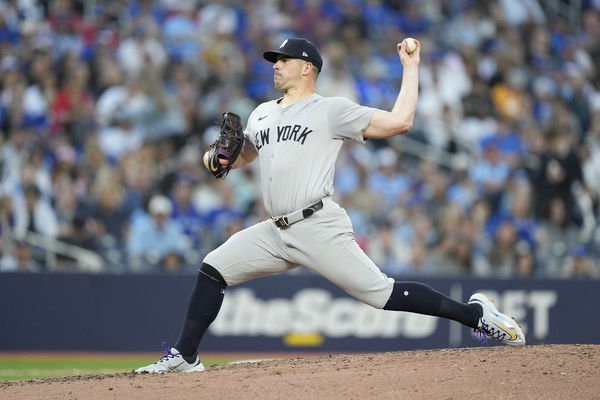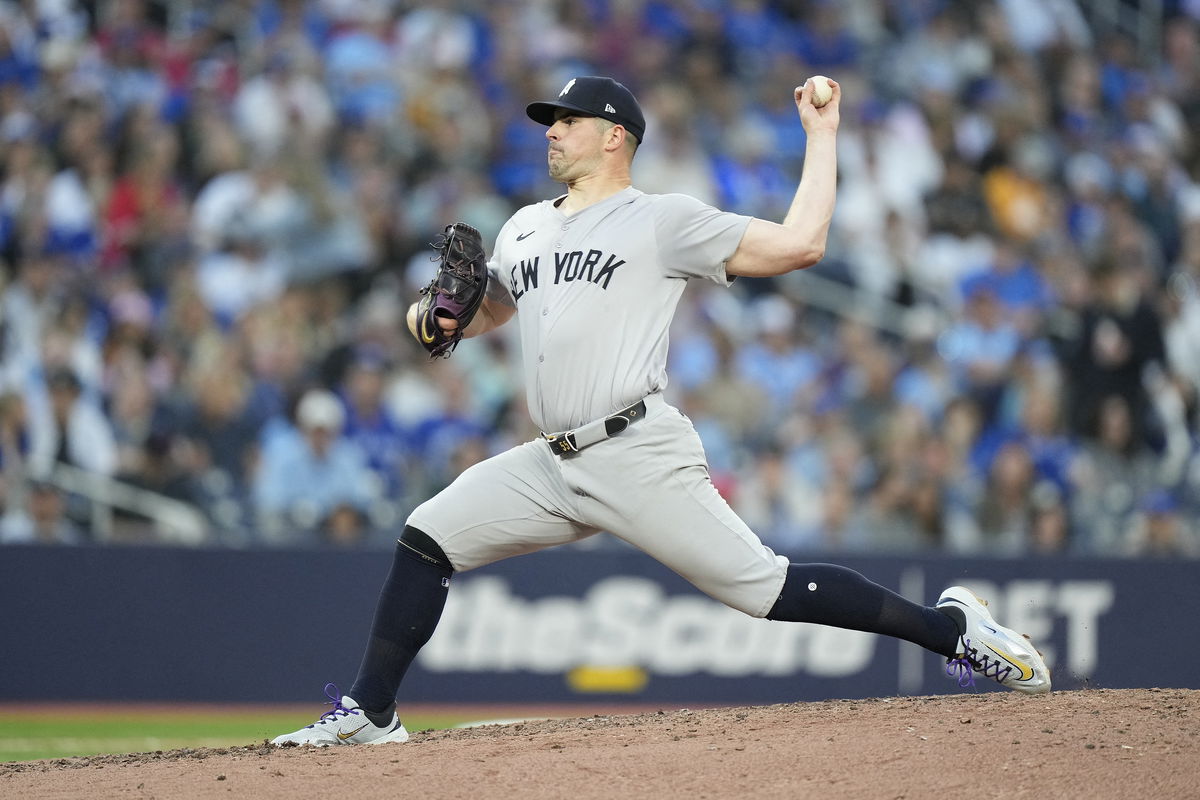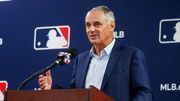
USA Today via Reuters
Credit: John E. Sokolowski-USA TODAY Sports

USA Today via Reuters
Credit: John E. Sokolowski-USA TODAY Sports
After winning the series 2-1 over the Houston Astros on Thursday night, the Yankees players lounged together to watch the NFL’s Dallas Cowboys and Philadelphia Eagles on the flat screens hanging in the Daikin Park visitors’ clubhouse. The atmosphere was quite the opposite of what the Yankees’ clubhouse looked like after Wednesday’s loss, where the umpiring and plate umpire Brian Walsh became the bigger story. Despite a hard-fought 8-4 win, though, GM Aaron Boone only commented, “Not how we drew it up.” Of course, the strike zone was still on fire. This time, the judgment came from outside the clubhouse.
New York was being treated differently from Houston, and catcher Austin Wells’ post-game words from Wednesday highlighted that. For one, Carlos Rodón’s wife, Ashley, decided to say what many in pinstripes were thinking. She tweeted on her X account, “The zone is absolutely horrendous, the entire series….GESH.”
Ashley had been watching her husband’s team grind through inconsistent umpiring all series, only to see critical moments swing on calls that Statcast and replay data later proved incorrect. For a Yankees team battling for October position, the impact wasn’t theoretical; it was measurable, and it was costly. New York had been forced to play uphill against more than just Houston’s bats. After the win, the Yankees were able to get 3 games back from the AL East-leading Blue Jays. But the ghosts of bad calls stuck to them.
ADVERTISEMENT
Just one game ago, on Wednesday’s eighth inning, José Altuve floated a soft liner that Ryan McMahon seemed to glove cleanly. But the ball slipped out on the transfer. Fans saw a catch. The Yankees saw a catch. Even the broadcasters’ comments on the replay agreed. Still, first-base umpire Brian Walsh waved it off, ruling no catch and gifting Houston an extra life. Then, Ashley had tweeted, “ABS. Over it,” to bring in automatic ball-strike and
Instead of walking off the field, New York had to grind through a fourth out, and the Astros cashed it in for a run that chopped into the Yankees’ lead. For Thursday’s game, plate umpire Adrian Johnson came in, yet the calls raised many eyebrows as he favored Houston by 0.58 runs.
The zone is absolutely horrendous the entire series….GESH
— Ashley Rodón (@AshleyRodon) September 5, 2025
ADVERTISEMENT
Ashley’s post did more than vent. It reignited the push for MLB to modernize its strike zone, whether by allowing teams to have challenges or by adopting automated assistance. For years, the league has resisted such a change, but with postseason races hanging in the balance, fans argue that every missed call carries consequences too heavy to ignore.
The Yankees may have survived the Astros, but if the strike zone remains this erratic, MLB’s credibility might not survive October.
ADVERTISEMENT
From frustration to outrage: Yankees fans echo Ashley Rodón’s claim
Ashley Rodón’s late-night post lit the match for a conversation already smoldering among Yankees fans. The reaction was swift, and the narrative shifted. This wasn’t just one bad series anymore; it was a boiling point that demanded attention. The timing hit a nerve, too. Fans rushed to claim that the calls reeked of favoritism toward the Astros. One supporter didn’t mince words, saying, “My favorite part is how they tried so damn hard to help their Astro pals and the Yanks still won the series.” Even in victory, the Yankees faithful felt the deck had been stacked.
“I mean, I think it’s pretty obvious that they don’t want the Yankees to make the playoffs with the amount of calls that have gone against them and it’s about damn time that they have challenges if this is how things are gonna go.” Suspicions of bias have been circulating throughout the entire series. The narrative is only strengthened by the 1.4-run swing Umpire Scorecards credited to Houston during Brian Walsh’s strike zone in Game 2. Add in the glaring miss of a strike call that was 6.78 inches off the plate, the largest error tracked league-wide this year, and the argument gains weight.
ADVERTISEMENT
Their demand for challenges on balls and strikes isn’t just emotional; it aligns with a broader push for MLB to modernize officiating, especially when borderline or blatantly wrong calls can reshape late-season standings. Another agreed with Ashley, commenting, “You got that right, Ashley. Many MLB Umps really suck. I’m looking forward to electronic balls and strikes.”
Top Stories
Rift Cracks Open in Blue Jays as Real Reason Behind Bo Bichette’s Exit Emerges, per Insider

Who Are Kyle Tucker’s Parents? All about Mike Tucker and Lisa Fernandez

What Is Kyle Tucker’s Ethnicity, Nationality, and Religion? All You Need to Know

Mets Immediately Retaliate After Cody Bellinger failure by Stealing Yankees’ Prime Trade Target

Dodgers Given Clear Advantage by MLB, Thanks to Concerning Loophole & Foolish 25-Year Commitment

In 2024, Statcast data showed over 12,000 missed ball-strike calls across the league, averaging about nine per game. While the overall accuracy rate sits near 88%, the issue isn’t volume as much as timing; missed calls in high-leverage spots can flip an inning, a game, or even a series. That’s why MLB has already tested the Automated Ball-Strike system in Triple-A and experimented with a challenge-based hybrid model in the minors, where teams could contest a handful of calls each game.
“McMahon made a clear catch. How could they blow that call? They gave the Houston A—-lez 4 outs and a free run.” The outrage over Ryan McMahon’s play returned on Thursday. It looked obvious to just about everyone watching, except the umpires.
ADVERTISEMENT
Then came the turn of the crew chief in the final series matchup, “Adrian Johnson being the crew chief is all you need to know! Biggest tool out of any umpire in the league.” Johnson, who has been in the league since 2006, carries a reputation for quick ejections and a strike zone that often ranks below average in consistency. Having him oversee the Yankees-Astros series only magnified frustrations when Brian Walsh’s missed calls piled up.
To fans, Johnson’s presence as crew chief signaled trouble from the start, and the series confirmed their worst suspicions. In their eyes, it wasn’t just bad luck; it was a crew led by someone they already viewed as part of the problem. The Yankees may have won, but the umpiring left a bigger mark than the scoreboard. Fans and even players’ families are calling out errors that changed the game’s flow. Unless MLB steps in, October could be remembered more for blown calls than big moments.
ADVERTISEMENT
ADVERTISEMENT
ADVERTISEMENT